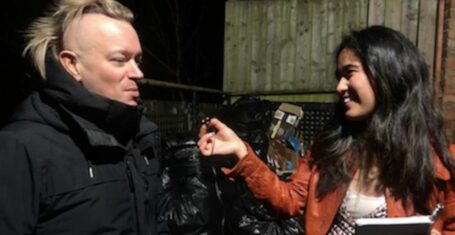
Reviewed: Dracula
Grace Cheatle reviews David Knowles’ chilling adaptation of Bram Stoker’s ‘Dracula’
Bram Stoker's 'Dracula' epitomises Gothic fiction; the plot is saturated with the arcane and the unspoken oppressive terror which drives the story was always going to be a difficult thing to emulate when bringing the novel to the stage. However, David Knowles' 'Dracula' adaptation achieved this with ease.
The element of this production which immediately sets it apart from most was the fact it was promenade, allowing the audience to follow characters, moving with them and enabling utter immersion in this fictional world.
Of course, the problem with such a staging choice is that the atmosphere can be lost in transit but instead, for many audience members, it seemed to intensify it. There became a shared terror – aided by the presence of the ushers – as we were rushed from scene to scene. The setting of Durham castle could not have been a more perfect choice for such a production; it enabled an effortless sense of period and later, in the closing scenes, absolute dread as one finds themselves enveloped in the darkness of the Norman chapel, surrounded by the brides of Dracula.
The cast were all simply outstanding. Despite the performance itself being so intimate, not one of them ever swayed from character. Joe Burke as Dracula himself was highly imposing, maintaining an eerie intensity throughout, complimented by his greatly unsettling, but slightly affected, vampire brides. Tom Mcnulty's Jonathan Harker was just incredible. He had a remarkable ability to draw the audience in from the off with a vulnerability and pervading essence of pure fear. He was magnetising. So much of this play relies on narrative, the recounting of past events by characters in the present, that there runs the risk of the plot slowing as the on-stage action ceases. Personally, I found the opposite – a huge commendation namely to the verbal skill of McNulty, Tim Blore and Elizabeth O'Connor.
Naturalism is understandably another quality which may spell trouble when acting as or with the vampiric, yet this was not lacking in a single performance. O'Connor's Mina Harker was natural and sincere throughout and provided a warmth which wonderfully offset the manic fervour of Tom Drysdale's Van Helsing. It was the subtlety in Mcnulty, O'Connor and Drysdale's performances which propelled the final scenes into their horrific conclusion, allowing the heightened emotion of the climax to be truly horrifying.
The use of sound and lighting was a clever one. With the actor's faces lit by the hand-held lights of the ushers, the repressive settings of the darkened rooms was able to remain intact, but with no actor's expression lost. As with most terrifying scenes in theatre, it is what is not seen which can cause the most distress, and Knowles capitalised on this, removing the audience from scenes at the crucial moment, allowing just a scream or a gunshot to be heard.
The haunting ending of Harker's frantic running from the castle was absolutely chilling, encapsulating the entirety of the production; revelling in the unexplained.
David Knowles and Anna Jackson have created a breathtaking production and, to my mind, one of the most formidable pieces of theatre which has materialised in Durham thus far.









































